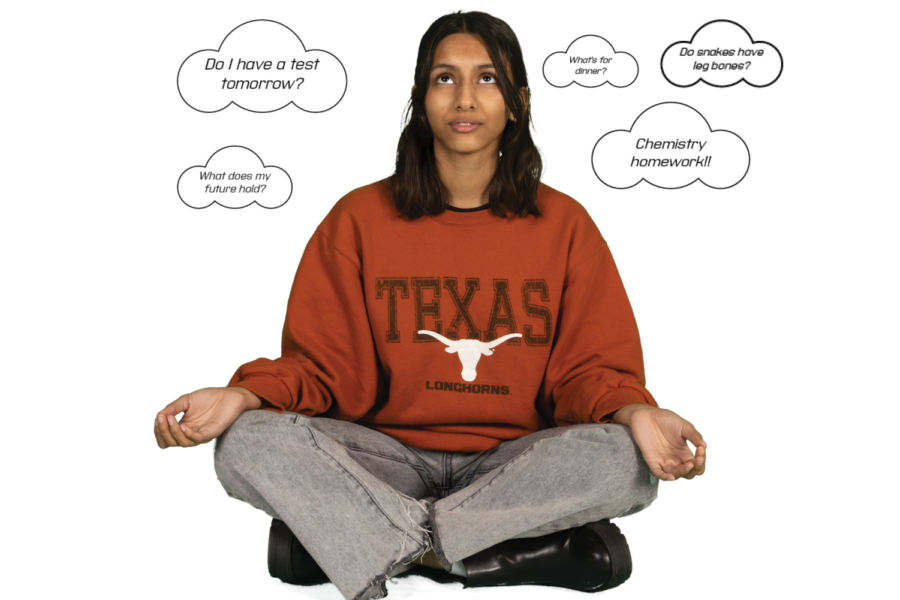Meditation madness
Sophomore describes her experiences with mental health and meditation
Photo by Truth Dukes
Students are overwhelmed with everything they have to worry about. Meditation is one method of relieving stress as a million thoughts run through students head.
November 2, 2022
Contrary to the average Indian immigrant parents’ beliefs, my mother doesn’t worry or be strict about my grades in the slightest. While possibly in part to my neurotic obsession with keeping good grades and my crippling fear of failure, she has always made it a point to stress the importance of mental health and not taking life too seriously above all else.
It’s no secret that highschool’s stressful. Endless amounts of homework, club meetings, tests and more contribute to the late night study sessions we’re all familiar with. For me especially, procrastination, lack of motivation and the inconvenient compulsion to complete every assignment with full and optimal effort are a deadly combination, leading to many long hours, and most importantly, yet another reason for my mother to worry.
Here enters—as put so eloquently by my mom—the solution to all problems, the bringer of world peace and the key to healing one’s soul: meditation.
Meditation: something discovered by my mom years ago due to her anxious child and the help of countless Brenee Brown books. A psychological awakening, some may call it. To some, meditation may conjure up the image of a monk sitting atop a hill in the stereotypical cross-legged position, hands on knees and eyes closed, but in reality, as much as I hate to admit it, meditation, like an onion, has layers, and is versatile and advantageous, despite my perpetual complaints in utilizing the practice.
Increased focus, patience, tolerance and positivity. Decreased stress, heightened awareness and creativity—all benefits of meditation. And what’s more, it’s been shown to decrease anxiety levels by over 60%, help with stress induced inflammation and lessen the risk of developing certain cardiovascular diseases. With this practice, the mental and physical health of individuals of all ages could significantly improve, and yet despite all these cogent advantages, I still can’t seem to bring myself to do it.
Perhaps I could blame it on being a teenager. After all, the more someone (especially a parent) tells you to do something, the less you want to do it, no matter how helpful said advice may be. That’s just logic. But personally, I don’t think it’s just that. In my mom’s pursuit to better me health-wise, the incentive to want to better myself mentally was somewhat lost.
It’s a feeling summed up by simply being between the ages of 13-18. A mixture of burnout, a paucity of motivation, general frustration, and in my case, just not wanting to engage in this particular activity. The thought of implementing meditation into my daily schedule felt more like a chore, something to distract from other academic duties, despite the fact that “it will help you get your work done faster.”
High school is a period of my life where I feel entitled to not have my life figured out or be the healthiest I’ve ever been. It’s not my peak, in more ways than one, and I feel as though it shouldn’t be. While I do agree with the importance of mental health as a concept, when it comes down to it, I just don’t feel like meditating. It’s as simple and unexplainable as that.
It’s not to say I won’t or never will. I really do believe in the benefits of this practice and appreciate my mom for introducing it to me early on. Once the so-called mediocre days of highschool have passed, and I feel ready to break out of my shell, the next step for self-improvement will follow, that is, meditation.
In all honesty, no one is the best version of themselves in high school, and that’s okay. All we can do is push forward, attempt to take care of ourselves as much as possible, and in some cases, very few cases, dabble a little in the art of meditation.
















